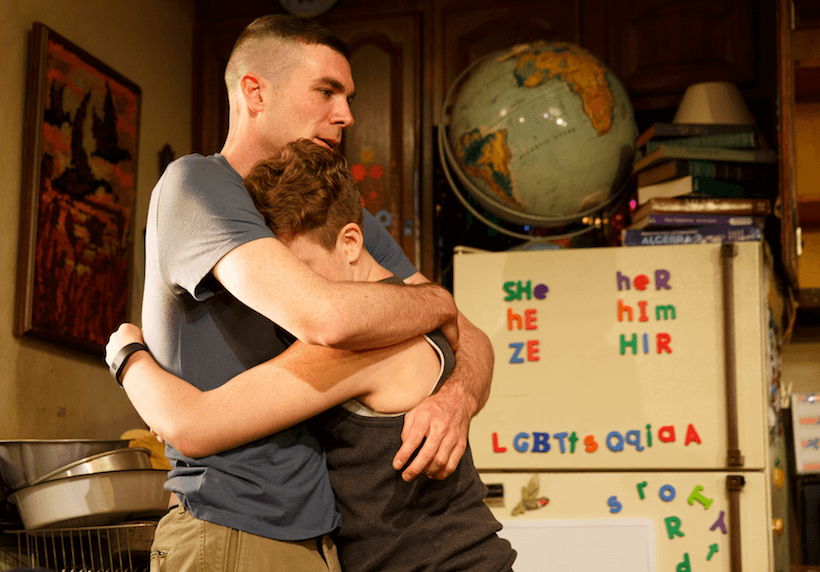Hir Is a Radical, Angry Play for the Modern Age

photo by Joan Marcus
Hir
Peter Jay Sharp Theater
416 West 42nd Street
When the curtain parts on Taylor Mac’s new play Hir at Playwrights Horizons, we see a house in exuberant disarray: clothes all over the floor, furniture piled by a door, hippie-era decals stuck all over the cabinets, everything topsy-turvy. And it doesn’t take long to discover that this disarray is an exact visual representation of the late-stage struggle that is going in this house between Paige (Kristine Nielsen), the newly giddy and liberated matriarch of a crumbling California family, and her husband Arnold (Daniel Oreskes), who was formerly very abusive but has now been reduced by a stroke. Paige keeps Arnold in make-up, a dress, and a clown-like wig, and she emasculates him as he once humiliated her. Before his stroke, Arnold had wanted to keep Paige in line in any brutal way he could, and Paige now wants to destroy what’s left of Arnold’s masculine power. This is not an easy job.
Mac is best known downtown for the epic saga The Lily’s Revenge and also for tireless and inventive excavations and performances of older songs, so Hir is a bit of a departure. It owes something to Sam Shepard in form, but it is radically different in content. Mac has called the tone of this play “absurd realism,” which means that it is realistic enough but also unafraid to be heightened and metaphorical, and of course Shepard wrote his best plays in this style. Shepard dislikes the male patriarch, often very intensely, but he cannot quite imagine a world where that patriarch could be removed. Mac, on the other hand, can clearly envision a world in which this could happen, but not without a kind of pitilessness. To be a revolutionary, you have to make tough choices and be tough yourself, and that’s what Mac is detailing in Hir.
The battle between Paige and Arnold is duplicated in the more complex battle between their children: the returning soldier Isaac (Cameron Scoggins), who has been in the army for years picking up pieces of dead bodies, and the female-to-male transgender Max (Tom Phelan), who has been teaching Paige, at her urging, about shifting gender paradigms. Mac has fun in the first act with the new vocabulary (some created, some not) that Paige and Max are reveling in, and also some of their touchiness when they try to protect their newborn sense of themselves. Nielsen has proven herself many times on our stages as a matchless comic technician, and she makes funny lines here sound even funnier with her tricky basso emphasis. Nielsen is such a distinctive comic player because her rhythms are always just slightly faster than you expect them to be, and this matches up perfectly with her character’s own caffeine-crazed embrace of a life built out of the ashes of her old sorrowful existence as a punching bag for her husband.
In the second act, Isaac has cleaned up the house (this must be a challenging thing for the stagehands to accomplish during the intermission), and never has tidiness and order looked more depressing and hopeless. Mac is clearly propagandizing for the colorful mess of the first act rather than the ugly old order revealed in the second, and he takes this theme to its logical conclusion, so that the climax of the play becomes quietly political and scathing. Paige can finally take no more of the re-surging masculine power in her house, however broken and hobbled it may be, and she tells Isaac off in low, calm, pitiless tones: “Wipe your tears,” Paige says to Isaac. “Pull yourself together and listen to me. It’s why we sent you, all the boys, to the wars to begin with. What do you do with leftover pieces? You can pretend you will use them for something but you never will. At a certain point you have to dispose of them.”
Paige has ascended to a kind of elevated knowledge that sees the peril ahead for herself and for Max, and also the radical toughness that they will need to survive. Mac reaches a moment at the end of Hir where humanism is posited as a luxury that you cannot afford if you are fighting an enemy, and there is real rage here at the impulse we have to try to fix something that has proven over and over again to be broken. Hir is a radical play, an angry play, and its content is specific, fresh, brainy, and potent. It might be a great play, like one of those Swiss watches that Ibsen used to make, though Mac is a modern in that the Swiss watch is made and then it is smashed so that it can be made again, and hopefully made better.
You might also like 



















